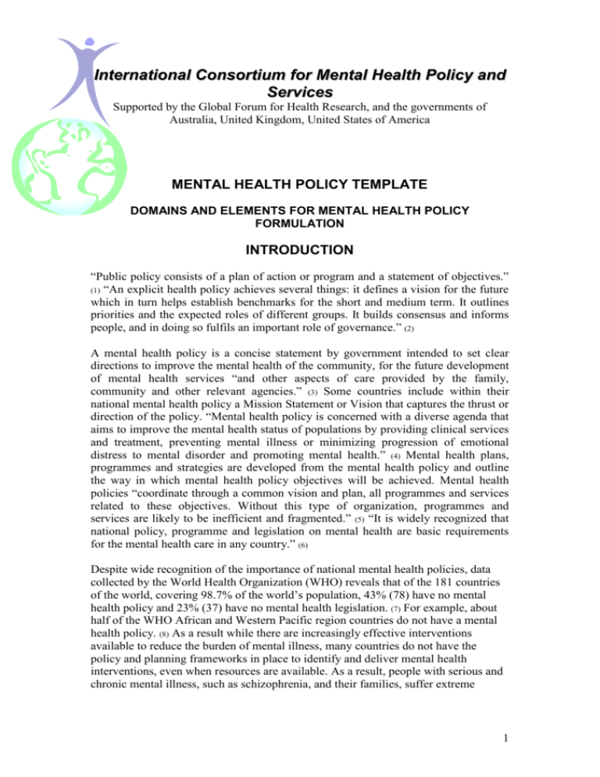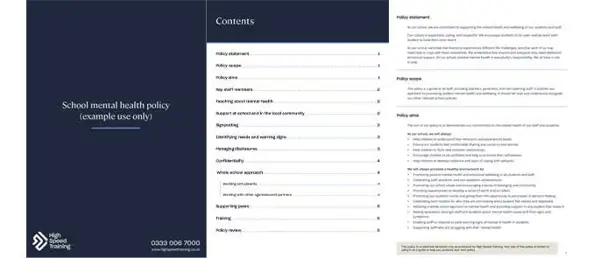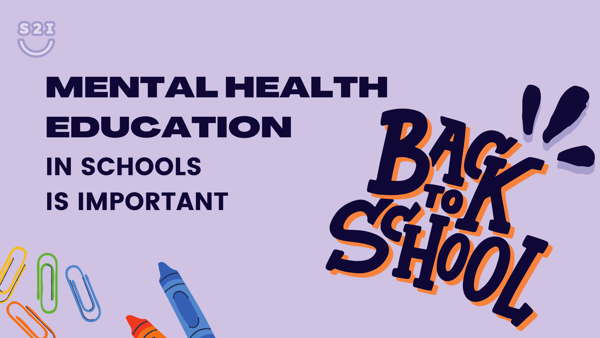In today's fast-paced world, the mental health of students has become a growing concern for educators, parents, and policymakers. School mental health policy plays a crucial role in addressing the mental well-being of students and creating a supportive environment for their academic and personal growth.
Table of Contents
- Importance of School Mental Health Policy
- Benefits of Implementing Mental Health Policy
- Key Components of primary school mental health policy
- Challenges in Implementing Mental Health Policy
- Resources for Developing Mental Health Policy
- Impact of Mental Health Policy on Student Well-being
- Implementation Strategies for School Mental Health Policy
Importance of School Mental Health Policy
School mental health policy sets guidelines and protocols for promoting mental well-being, preventing mental health issues, and providing support to students who may be struggling with their mental health. It ensures that schools have the necessary resources and strategies in place to address mental health concerns effectively.
Benefits of Implementing Mental Health Policy
Implementing a school mental health policy can lead to improved academic performance, reduced behavioral problems, enhanced social and emotional skills, and a supportive school environment where students feel safe and valued. It also helps in early identification and intervention of mental health issues.
Implementing a mental health policy in school can have numerous benefits for students, teachers, and the overall school community. Some of these benefits include:
- Improving students' overall well-being and academic performance
- Reducing stigma surrounding mental health issues
- Providing access to resources and support for students in need
- Promoting a positive and inclusive school environment
- Helping to identify and address mental health issues at an early stage
- Supporting the professional development and well-being of teachers and staff
By implementing a mental health policy in school, we can create a safe and supportive environment that allows all students to thrive and reach their full potential.

Key Components of a School Mental Health Policy
The key components of a school mental health policy include comprehensive mental health education, access to mental health professionals, crisis intervention protocols, mental health screening and assessment, staff training on mental health awareness, and partnerships with community mental health resources.
A school mental health policy is crucial for creating a supportive environment for students’ emotional well-being. Some key components of a comprehensive school mental health policy include:
- Prevention Programs: Implementing programs that promote positive mental health and prevent mental health issues.
- Early Intervention: Providing early intervention services to students who are experiencing mental health challenges.
- Training for Staff: Providing training for school staff on how to support students’ mental health and recognize signs of distress.
- Referral Systems: Establishing clear referral systems for students in need of more intensive mental health support.
- Partnerships with Community Providers: Collaborating with mental health professionals and community organizations to provide additional resources and support.
By incorporating these key components into a school mental health policy, schools can help create a safe and supportive environment for all students to thrive academically and emotionally.

Challenges in Implementing Mental Health Policy
Some challenges in implementing school mental health policy include stigma surrounding mental health, limited resources and funding, inadequate training for staff, and coordination with external mental health services. Overcoming these challenges requires a collaborative effort from all stakeholders involved.
Implementing a school mental health policy poses a number of challenges. One of the main challenges is ensuring that there is adequate funding and resources available to support the implementation of the policy. This can include hiring qualified mental health professionals, providing training for staff, and offering appropriate mental health services to students.
Another challenge is overcoming stigma and resistance to mental health services within the school community. Some students, parents, and staff may be hesitant to seek help or support for mental health issues due to fear of judgment or lack of understanding.
Additionally, there may be logistical challenges in coordinating and integrating mental health services into the school environment. This can include issues related to communication, collaboration between different stakeholders, and ensuring that students have access to the support they need in a timely manner.
Overall, implementing a school mental health policy requires careful planning, collaboration, and a commitment to overcoming barriers in order to create a supportive and inclusive environment for students' mental health needs.

Resources for Developing Mental Health Policy
There are various resources available for schools to develop and implement a comprehensive mental health policy, including toolkits, guidelines, training programs, and partnerships with mental health organizations. Seeking support from mental health experts can also be beneficial in designing effective policies.
Creating a comprehensive mental health policy in schools is essential to support the well-being of students and staff. Here are some resources to help guide you in developing an effective mental health policy:
- School Mental Health Policy Guide - This comprehensive guide provides step-by-step instructions on developing a mental health policy tailored to the needs of your school.
- CDC School Mental Health Resources - The Centers for Disease Control and Prevention offers a range of resources on mental health promotion in schools, including policy development tools and best practices.
- National Alliance on Mental Illness (NAMI) - NAMI provides resources and support for mental health advocacy, including policy development for schools.
- MentalHealth.gov - This website offers resources and information on mental health policy and advocacy at the national level.
By utilizing these resources, you can create a strong and effective mental health policy for your school that supports the well-being of all students and staff.

Impact of Mental Health Policy on Student Well-being
A well-designed and implemented school mental health policy can have a significant impact on student well-being, including improved mental health outcomes, increased resilience, better social relationships, and higher academic achievement. It also creates a culture of mental health awareness and support within the school community.
Having a strong mental health policy in schools is crucial for supporting the well-being of students. This policy can help identify and address mental health issues early on, providing students with the resources and support they need to thrive academically and emotionally.
By implementing a comprehensive mental health policy, schools can create a supportive environment where students feel comfortable seeking help and discussing their mental health concerns. This can lead to improved academic performance, reduced dropout rates, and overall better student well-being.
Furthermore, a mental health policy can help destigmatize mental health issues and promote a culture of acceptance and understanding within the school community. This can encourage students to prioritize their mental health and seek help when needed, ultimately leading to a healthier and more successful student body.

Implementation Strategies for School Mental Health Policy
Effective implementation strategies for school mental health policy include creating a mental health committee, conducting regular assessments of mental health needs, providing ongoing professional development for staff, engaging parents and students in mental health initiatives, and monitoring the impact of the policy on student outcomes.
Implementation Strategies for School Mental Health Policy
Creating and implementing a school mental health policy is crucial in ensuring the well-being of students and staff members. Here are some effective strategies for successfully implementing a school mental health policy:
1. Collaboration: It is essential to collaborate with various stakeholders, including students, parents, teachers, administrators, and mental health professionals, in developing and implementing the policy.
2. Training and Education: Provide training and education for school staff on recognizing and addressing mental health issues, as well as how to support students in need.
3. Establishing Support Systems: Create a system of support within the school that includes mental health professionals, counselors, and other resources for students who require assistance.
4. Awareness and Communication: Raise awareness about mental health and the school's policy through workshops, campaigns, and other communication channels.
5. Monitoring and Evaluation: Regularly monitor and evaluate the implementation of the policy to identify areas for improvement and ensure that the needs of students are being met.
By implementing these strategies, schools can create a safe and supportive environment that promotes the mental well-being of students and staff.

Key Takeaways
- School mental health policy is essential for promoting the well-being of students.
- Implementing mental health policy can lead to improved academic performance and a supportive school environment.
- Key components of a school mental health policy include education, access to professionals, crisis intervention, screening, staff training, and community partnerships.
FAQ
What is the role of school mental health policy?
School mental health policy plays a crucial role in promoting mental well-being, preventing mental health issues, and providing support to students who may be struggling with their mental health.
How can schools overcome challenges in implementing mental health policy?
Schools can overcome challenges by addressing stigma, securing resources and funding, providing staff training, and establishing partnerships with community mental health resources.



Recent Comments